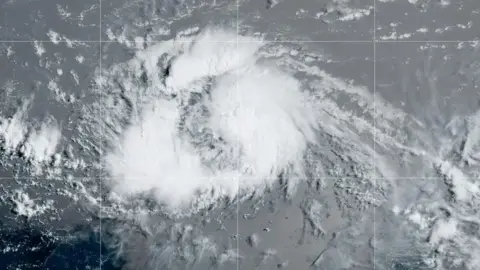Tropical Storm Bret expected to bring strong winds and rain to Caribbean
 National Oceanic and Atmospheric Administration
National Oceanic and Atmospheric AdministrationTropical Storm Bret continues to march towards the Caribbean, potentially bringing heavy flooding to urban areas and strong winds by Thursday.
But the US National Hurricane Center (NHC) says Bret may not strengthen to a hurricane as previously suggested.
On Tuesday night, the storm was about 780 miles (1,255km) from the Windward Island archipelago, officials say, adding it is unlikely to hit the US.
Tropical storm watches have been issued in Barbados, St Lucia and Dominica.
The alerts mean that tropical storm conditions are expected in the area within the next 48 hours.
A tropical storm becomes a hurricane once its maximum sustained winds reach a speed of 74 mph. It is currently carrying winds of 45mph (75km/h), according to the Miami-based NHC.
"Rainfall amounts of 4 (10cm) to 6in with maximum amounts of 10in are possible across portions of the Lesser Antilles from Guadeloupe southward to St Lucia," the NHC said.
"Rainfall amounts of 2 to 4in are possible across Barbados and St Vincent and the Grenadines."
The NHC bulletin added that so far it is not been able to get "a better handle on the system's intensity and size".
Residents of the Lesser Antilles, Puerto Rico and the Virgin Island have also been warned to brace for stormy conditions by Thursday evening.
Forecasters say it is too soon to tell exactly where the storm will hit as well as how much damage it could bring. Officials say they are concerned about flooding sparked by rapid rainfall. Higher elevation hillsides and urban areas are most at risk.
The storm is expected to weaken after it moves into the Caribbean on Friday into the weekend, according to the most recent forecast.
Bret is a rare type of storm for this early in the hurricane season, which begins in June and lasts through November. Colorado State University meteorologist Philip Klotzbach wrote on Twitter that the storm set a record because it was the farthest east a tropical storm had formed in the tropical Atlantic in June.
The National Oceanic and Atmospheric Administration has predicted a "near-normal" Atlantic hurricane season this year, with anywhere from 12 to 17 storms expected. Bret is the third tropical storm of this year, according to the NHC.
The impact of climate change on the frequency of storms is still unclear, but it is known that increased sea surface temperatures warm the air above and make more energy available to drive hurricanes, cyclones and typhoons. As a result, they are likely to be more intense with more extreme rainfall.
